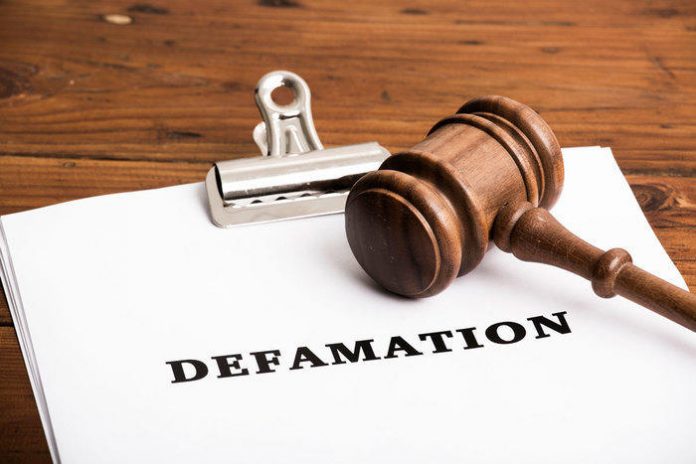This article is written by Rida Zaidi, a law student of the Faculty of Law, Aligarh Muslim University. The author tries to deal with the legal applicability of the defamation notice sent to Netflix India for a satirical show ‘Hasmukh’ which exposes the ills of the legal profession.
This article has been published by Rachit Garg.
Table of Contents
Introduction
“Legal profession has always been an important limb for the administration of justice. Without the profession of law, the courts would not be in a position to administer and provide justice efficiently. Such an act of defaming the legal professionals among the general public in India through an online TV series on web portals is clearly an act falling within the ambit of defamation.”
The legal profession is noble employment and is the very fabric of every society. Lawyers undertake to serve people from all walks of life with utmost diligence. Legal Community rests the interest of the people above all. Though the goodwill of the titled profession of law gets maligned sometimes by the media houses or by certain people who promote that the law profession is full of corruption and fallacy. One such example is of a comedy series named ‘Hasmukh’ streaming on Netflix India which made certain derogatory comments regarding the legal community and the law professionals. It has jeopardized the sentiments of the law professionals as they feel that through the series the grandeur and image of the said community would depreciate as the online streaming platform on which this series airs is Netflix India which bears around 150 million subscribers. Two advocates have sent a defamation notice to the streaming platform Netflix India and the producers and comedian for removing or deleting the false and inauthentic content which brings disregard to the entire legal community from their platform. They have also warned the producers and the performers to do the needful otherwise this could lead to the initiation of civil or criminal proceedings against them.
This article shall deal with the legal relevancy of the defamation notice sent and what the Court concluded regarding the said issue.
Contents of the defamation notice
The defamation notice was sent by advocate Abhishekh Bhardwaj and advocate Hardik Vashishth to Netflix entertainment services who were the broadcasters, Emmay Entertainment who were the producers and Vir Das who was the performer. The notice stated the following concerns-
- The notice pointed out that Netflix is one of the largest online streaming platforms which enjoys subscribers from every corner of the World.
- The series ‘Hasmukh’’s season 1 of episode 4 titled ‘Bumbai mei Bambu’ alleged the lawyers as ‘rapists, scoundrels, thieves and goons’
- The derogatory statements made against the law community and its professionals would dishonour and disregard the standing of the noble profession of law and would damage the cordiality of the legal profession. It may also lead to impugning their role in the eyes of the general public.
- The damage that it will cause cannot be justified by any reasoning or logic whatsoever, as the stretch of damage is non-compensable through any monetary compensation.
- The series ‘Hasmukh’ is an intentional attack on the reputation of the lawyers and has resulted in character assassination of the law professionals who have selflessly served every section of society.
- The derogatory statements made by the protagonist of the show has defamed the lawyers and their white-collar job.
- The advocates have called for an unconditional apology by the producers and the performer that the aspirations made by them in the series ‘Hasmukh’ is frivolous and has defamed the lawyers.
- They have also asserted the removal or deletion of the particular content from the Netflix platform.
- They have also stated that if the producers and the performer failed to comply with their notice they would initiate both civil and criminal proceedings for which all the cost and consequences shall be borne by the production, the performer, the streaming platform Netflix.
Defamation under the Indian Penal Code
Defamation, as defined under Section 499 of the Indian Penal Code (1860), is publishing any statement by either word spoken or written or expressed through signs and gestures defaming someone in the eyes of the reasonable people of the society or have reason to believe that such imputation would harm the reputation of the concerned person or body of persons. Section 500 of the Indian Penal Code prescribes simple imprisonment for the offender which may extend to two years or more or with a fine or both.
Exceptions of defamation
The exceptions of defamation under Section 499 of the Indian Penal Code are as follows-
- Truth in a defamatory remark
Where the information published is such which is true and is made for the public good, it acts as a defence for defamation.
- Just Criticism of Public Servant
Where a public servant has discharged his functions in his official capacity and it appears to be wrong to someone belonging to the class of general public is not an act of defamation.
- Comments made in good faith
The important ingredient lies in the fact that the concerned statement or information is made or delivered in good faith.
- Fair comment regarding public men
Where criticism is expressed against public men, it does not amount to defamation.
- Recordings of decisions of case proceedings
Where any information is regarding the decision of a court case or reports of a Court case, it shall not be defamatory.
- Quality of comments or witnesses
Where the comments are regarding the merits of a case or regarding the conduct of the witnesses.
- Critiquing literature
Where an author has submitted his work for judgement in the eyes of the general public, any review given by someone regarding that particular work of the concerned author would not amount to defamation.
- Censuring authority
When someone disapproves of another’s conduct that would not amount to defamation except if the disapproving party is the censuring authority or it has a binding authority arising out of any valid contract.
- Lawful authority
Where a person or body of persons has lawful authority to condemn another.
- Where a person imputes against another for the sake of protection of his interests or the public good, it does not amount to defamation.
Ashutosh Dubey v. Netflix India & Ors (2020)
Plaintiff- Ashutosh Dubey
Defendants- Netflix India & Ors
Facts of the case
- The plaintiff seeks an injunction notice against the further airing of episode 4 of season 1 of the show ‘Hasmukh’
- The protagonist has made some serious disparaging and defamatory comments against the lawyers which malign their reputation.
Contentions of the plaintiff
- The learned counsel asserted that the remarks that were made against the lawyers were not at all humorous or satirical and do not fall within the boundaries of a critique.
- The derogatory remarks were extremely dishonouring against the legal profession and its professionals. Furthermore, it creates a stigma upon the image of the lawyers in the eyes of the general public.
Contentions of the defendant
- The learned counsel for the defendants contended that the plaintiff has no prima facie evidence to show that he received any personal injury or violation of any of his rights which entitles him to the grant of an injunction.
- The series is a satirical dark comedy surrounding the protagonist who is a comedian who pursued his career by performing in comedy shows. In the particular episode 4 of the series ‘Hasmukh,’ he encountered a lawyer who was greedy, violent and duped him into entering an unfavourable Contract for which the lawyer charged him exceptionally high fees and eventually the protagonist murders him.
- The lawyers cannot be defamed as ‘class of lawyers’ and the plaintiff cannot be defamed as an individual by general reference of the class to which the individual belongs.
- Whenever any defamatory remarks are made they are made against a definite and determinate body of persons or an individual so that it can be said that it is imputed against these persons.
- The plaintiff has failed to show any cause behind instituting the suitor that he has encountered any injury or an irreparable loss.
- The series is a fictional one and is a result of imagination and humour and it must be taken in that particular way only.
- The particular comments were made by the protagonist in the concerned episode when he was deceived by the professionals of the law field and eventually as a result of his experience he made the satirical comments.
- As the web series is a satirical dark comedy, the comedian has just tried to expose the ills of all professions including the law profession and to deliver satirical comments a point is exaggerated to the extent that it becomes satirical.
- As the viewers are well versed with the fact that it is a comedy show any statement made by the protagonist would not be believed by them as a matter of truth and they would take it with a pinch of salt.
- Satire is a work of art and uses various techniques such as exaggeration, reversal, parody, etc. to ridicule its subject to the extent that it becomes satirical.
- Granting an injunction would result in the interference of freedom of speech and expression of the defendants which is guaranteed under Article 19(1)(a) of the Constitution.
Observation of the Court
The Court observed that, for the imputation of defamation under Section 499 of the Indian Penal Code derogatory remarks are to be made against an identifiable group of persons or individuals and in the present case the remarks that were made by the protagonist against the legal community were not made against a determinate or definite body of persons and lawyers as a class cannot be defamed. Furthermore, the plaintiff cannot assert that the general reference of satire that was made was specifically directed towards him. The plaintiff failed to show any evidence as to prove that he received any injury or violation of any of his rights by delivering such remarks by the protagonist. The derogatory remarks that were made against the legal profession which seeks to disparage the reputation of lawyers in the eyes of the general public were held by the Court to be made out of satire as the show was satirical. The series ‘Hasmukh’ is a satirical dark comedy that tries to expose the ills of the legal profession, particularly in the 4th episode. Satire is delivered by exaggerating the point to the extent that it becomes humorous. The Court dismissed the application of interim injunction by the plaintiffs as granting one would result in the restriction of fundamental rights of the defendants which is freedom of speech and expression as guaranteed under 19(1)(a) Article of the Constitution.

Precedent judgements referred in this case
The Patna High Court observed that for an offence of defamation the words or visible representations made should be imputed concerning a class of persons and whose reflection has to be established by the plaintiff and where it cannot be established that is the plaintiff is not able to prove any personal injury incurred on him or violation of any of his rights and when the remarks apply equally to the rest of the people belonging to that class, the case does not attract Section 499 of the Indian Penal Code.
The Rajasthan High Court held that for any defamatory statement to be actionable it should be remarked against a definite and identifiable group of persons and lawyers as a class is too wide. It is not a homogenous group of persons and is a heterogenous one. Furthermore, it is too varied and is ever-changing as old lawyers depart and new lawyers enter the profession.
Conclusion
Defamation is the act of defaming another either through words spoken or written in a way that his reputation gets injured in the eyes of the reasonable men of the society. One such incident mentioned here is regarding a defamation notice sent to Netflix India for streaming a satirical show on its platform which disparages and disreputes the image of the lawyers and the legal profession. The advocates which sent the concerned notice stated that it has hurt the sentiments of the law professionals as it injures the goodwill of the lawyers who belong to a noble profession and works selflessly for society. It has asked the defendants for the removal, deletion of the defamatory content otherwise they would initiate civil or criminal proceedings. Another suit was instituted regarding the same issue where the Court held that the granting of the interim injunction would mean interference in the exercise of the fundamental rights of the defendants which goes against the essence of democracy. The show is a satirical dark comedy exposing the ills of the legal profession and was not intended to disrepute the lawyers’ reputation. Therefore, the Court dismissed the application for grant of an interim injunction by the plaintiff.
References
- https://www.livelaw.in/news-updates/defamation-notice-sent-to-makers-of-netflix-show-hasmukh-over-remarks-on-lawyers-155519
- https://globalfreedomofexpression.columbia.edu/cases/ashutosh-dubey-v-netflix-inc/
- https://lawstreet.co/celebstreet/hasmukh-defamationnotice-netflix/
- https://www.latestlaws.com/latest-news/defamation-notice-served-to-netflix-s-show-hasmukh-over-inauthentic-content-against-legal-community
LawSikho has created a telegram group for exchanging legal knowledge, referrals and various opportunities. You can click on this link and join:
https://t.me/joinchat/L9vr7LmS9pJjYTQ9
Follow us on Instagram and subscribe to our YouTube channel for more amazing legal content.
 Serato DJ Crack 2025Serato DJ PRO Crack
Serato DJ Crack 2025Serato DJ PRO Crack










 Allow notifications
Allow notifications


